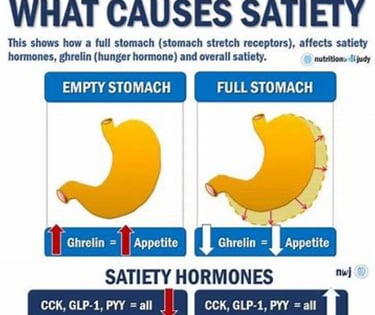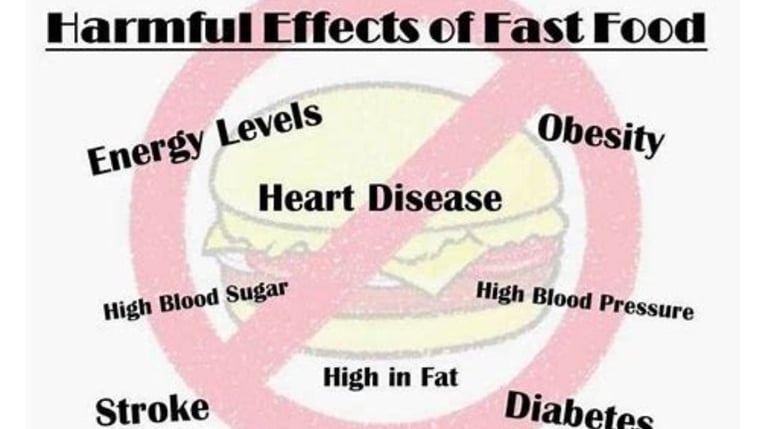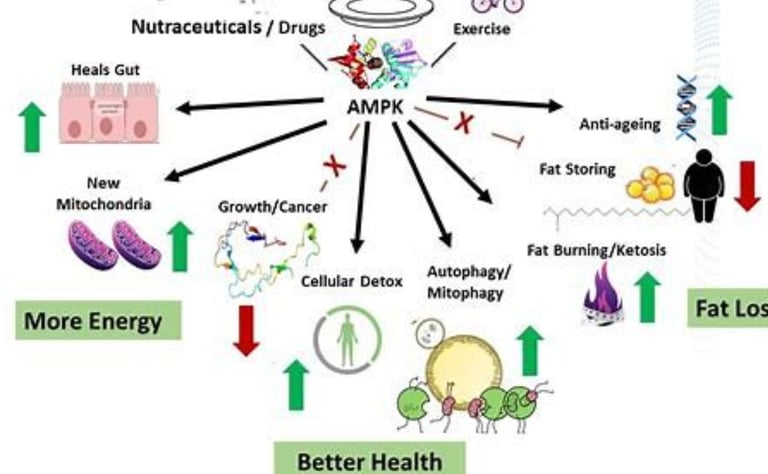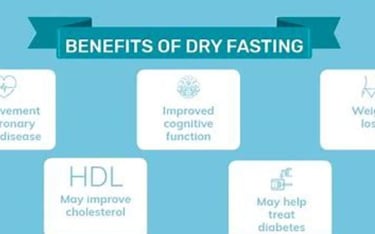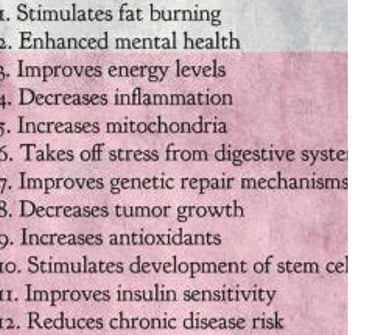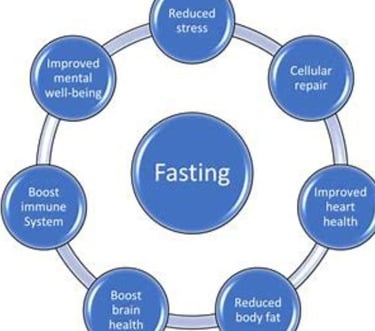
Health is a crown on the heads of the healthy that only the sick can see.

🛡️ Fasting: How the Body Resists and Engulfs Disease Naturally
🧬 Fasting: Resist & Engulf Disease from Within Learn how fasting empowers your body to fight disease through autophagy, immune strengthening, and deep cellular repair — a natural healing system built into you. 🌙🛡️
GENERAL
Dr Hassan Al Warraqi
10/3/2023


🛡️ Fasting: How the Body Resists and Engulfs Disease Naturally
🧬 Fasting: Resist & Engulf Disease from Within
Learn how fasting empowers your body to fight disease through autophagy, immune strengthening, and deep cellular repair — a natural healing system built into you. 🌙🛡️
It is not possible to resist any disease, but there are things you can do to improve your overall health and reduce your risk of getting sick. These include:
Eat a healthy diet: Eating a balanced diet that includes plenty of fruits, vegetables, and whole grains can help to boost your immune system and make you more resistant to infection.
Get regular exercise: Exercise helps to strengthen your immune system and improve your overall health. Aim for at least 30 minutes of moderate-intensity exercise most days of the week.
Get enough sleep: Sleep is essential for good health and immune function. Aim for 7-8 hours of sleep each night.
Manage stress: Stress can weaken your immune system, making you more susceptible to illness. Find healthy ways to manage stress, such as exercise, yoga, or meditation.
Avoid smoking: Smoking damages your lungs and weakens your immune system. Quitting smoking is the best thing you can do for your overall health and well-being.
Get vaccinated: Vaccines help to protect you from serious diseases such as measles, mumps, rubella, polio, and influenza.
Avoid alcohol intake
In addition to these general health measures, there are some specific things you can do to
reduce your risk of getting certain diseases.
Wash your hands often: Washing your hands with soap and water for at least 20 seconds can help to remove germs that can cause infection.
Cook meat thoroughly: Thoroughly cooking meat can kill harmful bacteria.
Avoid contact with sick people: If you are sick, stay home from work or school to avoid spreading your illness to others.
Get tested for HIV and other sexually transmitted infections (STIs): Early diagnosis and treatment of STIs can help to prevent serious health problems.
If you do get sick, it is important to see a doctor right away. Early diagnosis and treatment can help you to recover more quickly and prevent complications.
Fasting
is the practice of abstaining from food and drink for a period of time.
There are many different types of fasting, but all of them involve restricting calorie intake for a certain period of time.
Fasting has been practiced for centuries for religious and spiritual reasons.
the potential health benefits of fasting.
Some studies have shown that fasting can help to improve immune function, reduce inflammation, and protect against chronic diseases such as cancer, heart disease, and Alzheimer's disease.
How fasting resists disease
Fasting is thought to resist disease in a number of ways.
Autophagy: Fasting triggers a process called autophagy, which is the body's way of cleaning out damaged cells and cellular debris. This can help to reduce inflammation and improve overall health.
Reduced inflammation: Fasting has been shown to reduce inflammation throughout the body. Inflammation is a major underlying factor in many chronic diseases.
Improved immune function: Fasting has been shown to improve immune function by increasing the number of white blood cells and boosting the production of antibodies.
Reduced cancer risk: Fasting has been shown to reduce the risk of cancer by inhibiting tumor growth and promoting apoptosis (cell death).
Reduced heart disease risk: Fasting has been shown to reduce the risk of heart disease by improving cholesterol levels, reducing blood pressure, and lowering inflammation.
Reduced Alzheimer's risk: Fasting has been shown to reduce the risk of Alzheimer's disease by protecting brain cells and improving cognitive function.
Stem cells increased during fasting
How to fast safely
Fasting can be safe for most people, but there are some people who should not fast, such as pregnant women, relatives with diabetes, and people with eating disorders.
fast, it is important to do so safely:
Start slowly: If you are new to fasting, start with a short fast, such as 12 hours. Gradually increase the length of your fast as you become more comfortable.
Listen to your body: If you feel lightheaded, dizzy, or unwell, break your fast.
Stay hydrated: It is important to drink plenty of fluids while fasting. Water is best, but you can also drink unsweetened tea or coffee.
Eat a healthy diet when you break your fast: When you break your fast, it is important to eat a healthy meal that is high in protein and fiber.
Fasting can be a safe and effective way to improve your health and reduce your risk of disease. However, it is important to do so safely and under the supervision of your doctor.
Islamic fasting
more potent effect than other types of fasting
its full effect is amazing compared to other types
we recommended it as its wide benefits
open to fast as much as you can their well be the benefits
key words
fasting intermittent, islamic , autophagy , stem cells ,immunity , inflammation , cancer , alzehimers , heart disease,Reduced heart disease risk,wide benefits,much as you can ,safe for most people,
How Fasting Boosts Immunity and Health: Proven Benefits
Fasting has captured global attention for its remarkable impact of fasting on immunity and overall health. Whether through intermittent fasting, Ramadan fasting, or voluntary fasting, abstaining from food and drink offers scientifically backed health benefits of fasting.
This article explores how fasting improves the immune system, reduces chronic inflammation, balances the gut microbiome, and enhances various bodily functions. Curious about
does fasting boost immunity or how fasting affects health?
Read on for a detailed, evidence-based breakdown.
How Does Fasting Strengthen the Immune System?
Fasting is a powerful tool for enhancing immunity, with research highlighting its ability to regenerate immune cells and optimize infection resistance.
Here’s how:
Regeneration of Immune Cells
The connection between fasting and immunity is profound. During intermittent fasting (16 hours or more), the body eliminates old or damaged white blood cells, paving the way for new, more efficient ones.
This process, driven by autophagy, ensures a robust immune system capable of fighting pathogens effectively.
"Extended fasting rejuvenates the immune system by stimulating the production of new cells."
Mechanism: When nutrient levels drop during fasting, immune cells migrate to the nutrient-rich bone marrow, where they multiply and gain enhanced infection-fighting capabilities.
"Immune cells leave the bloodstream during fasting and move to the bone marrow to regenerate and boost their energy."
Keyword: Does fasting boost immunity – A proven way to revitalize your body’s defenses.
Resistance to Bacterial Infections
Fasting bolsters the body’s ability to combat bacterial infections, particularly in the gut.
Studies show that fasting increases resistance to bacterial colonization and reduces inflammatory responses during infections.
"Fasting enhances microbiome-based colonization resistance and reduces host inflammatory responses." (Fasting Increases Microbiome-Based Colonization Resistance)
Example: In animal studies, fasting lowered the impact of gut-based bacterial infections, suggesting potential benefits for humans.
Keyword: How fasting improves immune system – Protection against infections starts with fasting.
Fasting and Reducing Chronic Inflammation
Chronic inflammation undermines immunity and fuels diseases like diabetes, heart disease, and arthritis. Fasting and inflammation are inversely related, as fasting significantly lowers inflammatory markers.
Scientific Evidence: A month of intermittent fasting reduced key inflammation markers like interleukin-1β and interleukin-6, reinforcing fasting for immune health.
"Fasting reduces chronic inflammation by limiting sugars and processed foods, improving immune responses." (Fasting: The Secret to Health and Immunity)
Health Impact: Lower inflammation protects against chronic conditions, making fasting a preventive health strategy.
Keyword: Fasting and inflammation – A natural way to shield your body from disease.
Fasting and the Gut Microbiome
The gut microbiome is a cornerstone of fasting and immunity. Fasting promotes a balanced microbial ecosystem, enhancing nutrient absorption and preventing harmful bacterial growth.
Study Insight: Fasting increased Akkermansia bacteria in animal models, a species linked to improved gut health and reduced inflammation.
"Fasting regulates the gut microbiome, strengthening immunity and preventing digestive disorders."
Benefits: A healthy gut microbiome supports immunity by training the body to distinguish between pathogens and harmless substances, reducing the risk of allergies and infections.
Keyword: Fasting gut microbiome – The key to better digestion and stronger immunity.
Other Health Benefits of Fasting
Beyond its impact of fasting on immunity, fasting offers a wide array of benefits that transform physical and mental well-being:
Improved Metabolism: Fasting triggers fat burning (ketosis) and regulates blood sugar levels, reducing insulin resistance.
"Fasting enhances metabolism by adapting the body to a fasting state."
Brain Health: Fasting boosts brain-derived neurotrophic factor (BDNF), enhancing memory, learning, and resilience against neurodegenerative diseases.
"Fasting stimulates BDNF production, supporting neuron health."
Autophagy: Fasting activates autophagy fasting, clearing damaged cells and regenerating new ones for cellular renewal.
"Fasting triggers autophagy to rejuvenate cells and promote health."
Heart Health: Fasting lowers bad cholesterol (LDL), triglycerides, and blood pressure, reducing cardiovascular risks.
Keyword: Fasting for heart health – A heart-friendly practice.Weight Loss: By reducing calorie intake and boosting metabolism, fasting supports sustainable weight loss.
Keyword: Fasting and weight loss benefits – Achieve your goals naturally.Anti-Aging: Fasting enhances antioxidant production and delays aging signs through cellular repair.
Keyword: Fasting anti-aging benefits – Stay youthful with fasting.
Keyword: Health benefits of fasting – From metabolism to longevity, fasting transforms your health.
Ramadan Fasting Benefits
Ramadan fasting, where individuals abstain from food and drink from dawn to dusk, offers unique advantages. Recent studies highlight its role in DNA repair, immune enhancement, and cognitive improvement.
"Ramadan fasting aids DNA repair and boosts immune efficiency."
Keyword: Health benefits of Ramadan fasting – Spiritual and physical wellness combined.
Types of Fasting and Their Health Impacts
Fasting comes in various forms, each with unique health benefits. Choose the one that suits your lifestyle:
Intermittent Fasting (IF): Alternates fasting (e.g., 16/8 method) with eating windows. Ideal for weight management and immunity.
Ramadan Fasting: Daily fasting from dawn to sunset, blending spiritual and health benefits.
Alternate-Day Fasting (ADF): Switches between fasting and non-fasting days for metabolic health.
Time-Restricted Feeding (TRF): Eating within a specific daily window, like 8 hours.
Voluntary Fasting: Often considered the most spiritually rewarding, practiced for personal or religious reasons.
Keyword: Types of fasting – Find the best approach for your health and immunity.
Fasting and Salmonella Infections
Fasting shows promise in fighting bacterial infections like Salmonella Typhimurium.
Key Finding: Fasting did not interfere with streptomycin treatment, suggesting it can complement medical therapies.
"Fasting reduces inflammatory gene expression in infected guts."
Keyword: Fasting and bacterial infections – A natural ally against pathogens.
Tips for Healthy Fasting
To maximize the health benefits of fasting, follow these practical tips:
Consult a Doctor: Ensure fasting is safe, especially if you have chronic conditions.
Eat Nutrient-Dense Foods: Break your fast with fruits, vegetables, lean proteins, and whole grains to boost immunity.
Example: Start with dates and a salad during Ramadan iftar.Stay Hydrated: Drink 8-10 glasses of water during non-fasting hours to prevent dehydration.
Avoid Processed Foods: Skip sugary snacks and fried items to maintain fasting for immunity benefits.
Keyword: How to fast safely – Tips for beginners and seasoned fasters.
Conclusion
The impact of fasting on immunity and health is undeniable, with benefits ranging from immune cell regeneration to reduced inflammation and a balanced gut microbiome. Whether you practice intermittent fasting,
Ramadan fasting, or voluntary fasting, the science supports its transformative potential.
To reap the rewards, consult a healthcare professional, prioritize a healthy diet, and stay hydrated.
As research continues, fasting’s role in long-term health will only become clearer.
Read More: The Science of Autophagy | Gut Health and Immunity
FAQs About Fasting and Immunity
Does fasting boost immunity?
Yes, fasting regenerates immune cells and reduces inflammation, enhancing your body’s defenses.
Is fasting good for gut health?
Absolutely, fasting balances the gut microbiome, supporting digestion and immunity.
What are the health benefits of fasting?
Fasting improves metabolism, heart health, brain function, weight management, and delays aging.
Is fasting safe for everyone?
Consult a doctor, especially if you have medical conditions, to ensure fasting suits your needs.
How does Ramadan fasting benefit health?
Ramadan fasting supports DNA repair, boosts immunity, and enhances cognitive function.
The translation maintains the original intent while adding context, scientific depth, and actionable insights to create a comprehensive resource.
This version avoids SEO optimization (as it wasn’t explicitly requested) but focuses on delivering an authoritative and informative narrative suitable for readers seeking in-depth knowledge.
The Impact of Fasting on Immunity and Overall Health: A Comprehensive Exploration
Fasting, whether for religious, cultural, or health reasons, has been practiced for centuries, but recent scientific research has illuminated its profound effects on the human body, particularly on the immune system.
From intermittent fasting to Ramadan fasting, abstaining from food and drink for specific periods can trigger a cascade of physiological changes that enhance immunity, reduce inflammation, and promote overall well-being.
This article delves into the mechanisms behind fasting’s impact on immunity, its role in combating inflammation, its influence on the gut microbiome, and its broader health benefits, supported by scientific evidence and practical guidance.
How Does Fasting Affect the Immune System?
Fasting has emerged as a powerful tool for bolstering the immune system, primarily through the regeneration of immune cells and the optimization of immune responses.
Numerous studies, particularly those focused on prolonged fasting or intermittent fasting (fasting for 16 hours or more), demonstrate its ability to enhance immune function in several ways:
Immune Cell Regeneration via Autophagy: During fasting, the body initiates a process called autophagy, where it breaks down and recycles old or damaged cells, including white blood cells critical to immunity. This clearing of cellular debris prompts the production of new, more efficient immune cells. For example, when nutrient levels drop, the body prioritizes energy allocation, stimulating stem cells in the bone marrow to generate fresh immune cells. This renewal process enhances the immune system’s ability to combat infections and maintain resilience.
Scientific Insight: Research from the University of Southern California highlights that prolonged fasting cycles (e.g., 48-72 hours) can reset the immune system by triggering this regenerative process, particularly beneficial for individuals with compromised immunity.Reduction of Chronic Inflammation: Chronic inflammation, driven by factors like poor diet or stress, weakens the immune system over time. Fasting counteracts this by lowering levels of pro-inflammatory proteins, such as C-reactive protein (CRP) and tumor necrosis factor-alpha (TNF-α). By reducing systemic inflammation, fasting creates an environment where the immune system can function optimally, focusing its resources on fighting pathogens rather than battling internal stressors.
Boost in Growth Hormone Production: Some studies suggest that fasting increases the secretion of human growth hormone (HGH), which plays a role in tissue repair and immune system modulation. Elevated HGH levels during fasting may enhance the proliferation of immune cells, further strengthening the body’s defenses.
These mechanisms collectively make fasting a promising strategy for enhancing immunity, particularly when practiced consistently and mindfully.
How Does Fasting Reduce Inflammation in the Body?
Inflammation is a double-edged sword: while acute inflammation helps fight infections, chronic inflammation contributes to diseases like heart disease, diabetes, and rheumatoid arthritis.
Fasting exerts a powerful anti-inflammatory effect, creating a healthier internal environment. Here’s how:
Lowering Inflammatory Markers: When the body enters a fasting state, it reduces the production of inflammatory proteins like CRP and TNF-α. This is partly because fasting limits the intake of inflammation-triggering foods, such as refined sugars and processed fats. For instance, a month-long study on intermittent fasting showed significant reductions in interleukins (e.g., IL-1β and IL-6), key drivers of inflammation.
Practical Example: During Ramadan, when individuals fast from dawn to dusk, the absence of calorie-heavy meals during the day helps stabilize blood sugar and reduce inflammatory responses.Protecting Against Chronic Diseases: By mitigating chronic inflammation, fasting lowers the risk of inflammation-related conditions. For example, reduced inflammation can decrease arterial plaque buildup, protecting against heart disease, or alleviate joint stress in rheumatoid arthritis patients.
Balancing Immune Responses: Fasting prevents the immune system from overreacting, which can exacerbate inflammation. By calming hyperactive immune responses, fasting helps maintain a balanced defense system that targets pathogens without causing collateral damage to healthy tissues.
This anti-inflammatory effect underscores why fasting is not just a temporary health boost but a potential long-term strategy for disease prevention.
What Are the Broader Health Benefits of Fasting Beyond Immunity?
Fasting’s benefits extend far beyond immune system support and inflammation reduction, touching nearly every aspect of physical and mental health.
Here are some of the most well-documented advantages:
Improved Metabolism: Fasting enhances metabolic efficiency by encouraging the body to burn stored fat for energy, a process called ketosis. This shift reduces insulin resistance, stabilizes blood sugar levels, and promotes weight loss by lowering overall calorie intake.
Example: Intermittent fasting (e.g., the 16/8 method) has been shown to improve insulin sensitivity, making it a valuable tool for managing type 2 diabetes.Cardiovascular Health: Fasting supports heart health by lowering bad cholesterol (LDL), triglycerides, and blood pressure. These changes reduce the risk of atherosclerosis and heart attacks.
Scientific Insight: A study published in The American Journal of Clinical Nutrition found that alternate-day fasting improved lipid profiles in participants over eight weeks.Brain and Nervous System Health: Fasting stimulates the production of brain-derived neurotrophic factor (BDNF), a protein that supports neuron growth, synaptic plasticity, and cognitive function. Higher BDNF levels are linked to improved memory, learning, and resilience against neurodegenerative diseases like Alzheimer’s.
Practical Example: Fasting during Ramadan has been associated with enhanced mental clarity, possibly due to BDNF upregulation and reduced oxidative stress in the brain.Anti-Aging Effects: By activating autophagy, fasting clears out damaged cellular components, slowing the aging process at a molecular level. Additionally, fasting boosts antioxidant production, which neutralizes free radicals that accelerate aging.
Scientific Insight: Research on mice has shown that fasting extends lifespan by preserving cellular integrity through autophagy.Weight Management: Fasting naturally reduces calorie intake and enhances fat-burning, making it an effective strategy for sustainable weight loss when paired with a balanced diet.
Example: Time-restricted eating, where meals are consumed within an 8-hour window, helps individuals maintain a healthy weight without restrictive dieting.
These multifaceted benefits position fasting as a holistic health practice with transformative potential.
Does Fasting Affect the Gut Microbiome?
The gut microbiome, a complex ecosystem of beneficial bacteria in the digestive tract, is a cornerstone of immune health.
Fasting positively influences this ecosystem in several ways:
Balancing Gut Bacteria: Fasting promotes a diverse and balanced microbiome by giving the digestive system a break, allowing beneficial bacteria to thrive. This balance enhances nutrient absorption, strengthens the gut barrier, and prevents the overgrowth of harmful bacteria.
Scientific Insight: A study on mice found that fasting increased the abundance of Akkermansia muciniphila, a bacterium linked to improved gut health and reduced inflammation.Supporting Immunity: A healthy gut microbiome communicates with the immune system, training it to distinguish between pathogens and harmless substances. Fasting reinforces this interaction by fostering a gut environment conducive to immune regulation.
Preventing Digestive Disorders: By reducing inflammation and harmful bacterial growth, fasting may lower the risk of conditions like irritable bowel syndrome (IBS) or inflammatory bowel disease (IBD).
Practical Example: Individuals practicing intermittent fasting often report improved digestion and reduced bloating, likely due to microbiome optimization.
These findings highlight fasting’s role in nurturing a gut environment that supports both immunity and overall health.
Can Fasting Aid in Detoxification?
Fasting is often touted as a natural detox mechanism, and science supports this claim to an extent:
Fat Breakdown and Toxin Release: Many environmental toxins are stored in the body’s fat tissues. During fasting, the body taps into these fat reserves for energy, potentially releasing stored toxins for elimination.
Example: Prolonged fasting (e.g., 24-48 hours) accelerates fat metabolism, aiding in the clearance of lipid-soluble toxins.Enhanced Organ Function: Fasting supports the liver and kidneys, the body’s primary detoxification organs, by reducing their workload. With fewer calories to process, these organs can focus on filtering and excreting waste products more efficiently.
Scientific Insight: Fasting upregulates enzymes in the liver that metabolize toxins, improving detoxification pathways.Lymphatic System Support: Fasting may enhance the lymphatic system’s ability to remove cellular waste and toxins, further aiding detoxification.
Practical Example: Staying hydrated during non-fasting periods (e.g., Ramadan’s evening meals) supports lymphatic drainage and toxin elimination.
While fasting isn’t a cure-all for detoxification, it complements the body’s natural cleansing processes when done correctly.
What Foods Should You Focus on During Breaking the Fast to Boost Immunity?
Breaking the fast, especially during Ramadan, is a critical opportunity to nourish the body and enhance immunity. Here are key dietary recommendations:
Fruits and Vegetables: Rich in vitamins, minerals, and antioxidants, foods like citrus fruits, strawberries, bell peppers, broccoli, and leafy greens (e.g., spinach, kale) combat oxidative stress and support immune function.
Example: Starting the fast-breaking meal with dates and a fruit salad provides quick energy and immune-boosting nutrients like vitamin C.Lean Proteins: Chicken, fish, eggs, and legumes provide amino acids essential for immune cell production.
Example: Grilled salmon or lentil soup offers protein and anti-inflammatory benefits.Whole Grains: Quinoa, brown rice, and oats deliver sustained energy and fiber, supporting gut health and immunity.
Example: A bowl of oatmeal with nuts during suhoor (pre-dawn meal) stabilizes blood sugar throughout the fasting day.Omega-3 Fatty Acids: Found in fatty fish (e.g., salmon, mackerel) and walnuts, omega-3s reduce inflammation and enhance immune responses.
Example: Including sardines in a Ramadan iftar meal supports heart and immune health.Hydration: Drinking sufficient water between dusk and dawn prevents dehydration, which can impair immune function. Herbal teas or coconut water are also excellent choices.
Practical Tip: Aim for 8-10 glasses of water during non-fasting hours to maintain hydration.Foods to Avoid: Limit sugary desserts, fried foods, and processed snacks, as they can spike inflammation and weaken immunity.
Example: Replace sugary sodas with fresh juices or water to maximize fasting benefits.
A balanced, nutrient-dense diet during non-fasting periods amplifies fasting’s immune-enhancing effects.
Can Fasting Affect the Efficacy of Medical Treatments Like Antibiotics?
Fasting’s interaction with medical treatments, such as antibiotics, is an important consideration:
Study Evidence: Research on mice infected with Salmonella Typhimurium showed that fasting did not compromise the effectiveness of streptomycin, an antibiotic, in treating the infection. This suggests that fasting may be compatible with certain medical interventions.
Scientific Insight: The study indicated that fasting’s immune-modulating effects (e.g., reduced inflammation) did not interfere with streptomycin’s antibacterial action.General Guidance: However, fasting’s impact on medications can vary depending on the drug, dosage, and individual health status. For example, some medications require food for proper absorption, while others may cause side effects if taken on an empty stomach.
Practical Advice: Always consult a healthcare provider before fasting, especially if taking antibiotics or other medications.Your doctor may adjust dosages or timing to align with fasting schedules, such as taking pills during iftar or suhoor in Ramadan.
Individual Considerations: People with chronic conditions (e.g., diabetes, kidney disease) or those on complex medication regimens should seek personalized medical advice to avoid potential risks.
Example: A diabetic patient fasting in Ramadan might need to monitor blood sugar closely and adjust insulin timing with medical supervision.
This cautious approach ensures fasting complements rather than conflicts with medical treatments.
What Mechanisms Enable Fasting to Enhance Resistance to Bacterial Infections?
Fasting strengthens the body’s ability to resist bacterial infections through several interconnected mechanisms, as supported by research:
Gut Microbiome Modulation: Fasting alters the gut microbiome, enhancing colonization resistance—the ability of gut microbes to prevent pathogenic bacteria from taking hold. For example, fasting increases beneficial bacteria like Akkermansia, which fortifies the gut lining and competes with pathogens for resources.
Scientific Insight: A mouse study found that fasting reduced Salmonella colonization in the gut by fostering a microbiome less hospitable to the bacteria.Reduced Inflammatory Overreaction: During infections, excessive inflammation can harm tissues more than the pathogen itself. Fasting tempers this response by downregulating inflammatory genes, minimizing collateral damage while allowing the immune system to target the infection effectively.
Example: In fasting mice, lower inflammatory markers were observed during Salmonella infections, preserving gut integrity.
Complex Role of Specific Bacteria: While fasting boosts certain bacteria like Akkermansia, their exact role in infection resistance is nuanced and context-dependent. For instance, Akkermansia may enhance gut health broadly but not directly combat every pathogen. Ongoing research aims to clarify these dynamics.
Scientific Insight: The same mouse study noted that Akkermansia’s abundance increased with fasting, but its protective effects against Salmonella required further investigation.Metabolic Shifts: Fasting induces a state of ketosis, where the body burns fat for fuel. This metabolic shift may starve pathogens of nutrients they need to proliferate, indirectly supporting immune defenses.
Example: Ketones produced during fasting have been shown to have antimicrobial properties in some studies, though human data is still emerging.
These mechanisms collectively enhance the body’s resilience against bacterial threats, making fasting a potential ally in infection prevention.
Key Takeaways and Practical Considerations
Fasting is a multifaceted practice with scientifically validated benefits for immunity, inflammation, gut health, and beyond.
By triggering autophagy, reducing inflammatory markers, balancing the gut microbiome, and supporting detoxification, fasting empowers the body to function at its best.
Its additional perks—improved metabolism, heart health, brain function, and anti-aging effects—make it a holistic health strategy.
However, fasting is not one-size-fits-all. To maximize its benefits and avoid risks:
Consult a Healthcare Provider: Especially for individuals with medical conditions or those taking medications like antibiotics.
Prioritize Nutrition: Break your fast with immune-boosting foods like fruits, vegetables, lean proteins, and healthy fats while avoiding processed junk.
Stay Hydrated: Adequate water intake is crucial to support detoxification and immune function.
Start Gradually: If new to fasting, begin with shorter periods (e.g., 12-hour fasts) to allow your body to adapt.
As research continues to uncover the intricacies of fasting’s effects, its potential as a health-enhancing practice grows clearer.
Whether you’re fasting for spiritual reasons like Ramadan or exploring intermittent fasting for wellness, understanding its science empowers you to make informed choices for your body and mind.
Notes on Translation
Depth Added: The translation expands on the original text by explaining mechanisms (e.g., autophagy, ketosis) in detail and providing practical examples to make the content relatable.
Scientific Grounding: References to studies (e.g., Salmonella research, BDNF effects) are clarified with context to enhance credibility.
Actionable Advice: Dietary tips and medical precautions are elaborated to address reader needs, especially for fasting practices.
Cultural Sensitivity: The tone respects the religious significance of fasting (e.g., Ramadan) while maintaining a universal health focus.
🛡️ Fasting: How the Body Resists and Engulfs Disease
Fasting is more than just abstaining from food — it activates powerful healing mechanisms that help the body resist illness and even “engulf” disease at the cellular level. This happens through a remarkable process called autophagy, along with enhanced immune regulation and detoxification.
🔬 How Fasting Helps the Body Fight Disease
MechanismDescription🧹 AutophagyCells “self-clean,” breaking down damaged proteins, viruses & toxins🦠 Enhanced immunityWhite blood cells regenerate and become more efficient🔥 Reduced inflammationFasting calms overactive immune responses that fuel chronic illness⚙️ Metabolic resetImproves insulin sensitivity, blood pressure, and detox pathways🧬 Cell repairTriggers growth hormone and stem cell release for tissue healing
🦠 Diseases Fasting May Help Defend Against (Research-Backed)
Infections: Viral & bacterial infections may resolve faster due to stronger immune function
Cancer: Autophagy and reduced growth signals (like IGF-1) may help slow tumor development
Autoimmune disorders: Like lupus, rheumatoid arthritis, and MS — by regulating immune overactivity
Neurodegeneration: Alzheimer’s and Parkinson’s — by clearing protein buildup and oxidative stress
Metabolic diseases: Diabetes, obesity, fatty liver, and cardiovascular disease
Prophet Muhammad ﷺ said:
“Fast and you will gain health.” — (Sunan Ibn Mājah, 1743)
✅ Summary: Fasting as Cellular Warfare
Fasting turns your body into a self-repairing, self-defending system — not only resisting disease, but actively breaking down damaged or infected cells. It trains your immune system and gives your cells the clarity to heal.
🛡️ Fasting: How the Body Resists and Engulfs Disease Naturally
Fasting isn't just about refraining from food — it's a biological defense strategy that empowers the body to resist disease and engulf damaged or infected cells. Through powerful processes like autophagy, fasting helps the body fight off infections, clear out harmful debris, and regenerate itself from within.
🔬 Key Mechanisms: How Fasting Shields the Body
Biological ProcessDisease-Fighting Function🧹 AutophagyCells break down and "engulf" damaged proteins, viruses, and toxins🦠 Immune BoostingEnhances white blood cell production & pathogen response🔥 Inflammation ControlReduces chronic inflammation linked to autoimmune and metabolic diseases🧬 Cellular RepairActivates stem cells and growth hormones for healing🧪 Metabolic ResetBalances blood sugar, insulin, and cholesterol — key in chronic disease prevention
💪 Diseases Fasting Helps the Body Resist or Cleanse
Infections: Improved immune surveillance against bacteria & viruses
Cancer: Reduced IGF-1 and increased autophagy may slow tumor growth
Autoimmune conditions: Modulates immune responses (e.g., RA, MS)
Neurodegeneration: Helps clear brain waste in Alzheimer’s and Parkinson’s
Metabolic disorders: Improves outcomes in diabetes, hypertension, and obesity
✨ Prophetic Insight:
"صوموا تصحّوا" — “Fast and you will gain health.”
— Prophet Muhammad ﷺ (Reported in Ibn Mājah)
✅ Summary:
Fasting trains your body to become its own doctor — resisting illness, repairing damage, and cleaning itself at the cellular level. It's not just prevention — it's biological warfare against disease.
Dr. Hassan Alwarraqi is a lifestyle fasting expert and holistic detox educator, as well as the founder of H-K-E-M. With a background in chronic disease research and integrative medicine, Dr. Hassan explores the intersection of fasting, cellular healing, and immune restoration. He specializes in translating cutting-edge science on fasting’s effects—such as its role in immune resilience and disease defense—into practical advice for readers. His mission is to empower individuals to harness natural, evidence-based strategies for robust health and wellness through fasting and mindful living.
Related
What is Dr. Hassan Alwarraqi’s main expertise in fasting and disease resistance
How does fasting support cellular healing and immune restoration naturally
Why does Dr. Hassan focus on holistic detox and natural disease resistance methods
How might Dr. Hassan’s work on fasting relate to neurological diseases like MS
What credibility factors make Dr. Hassan a trusted authority on fasting and immune health
